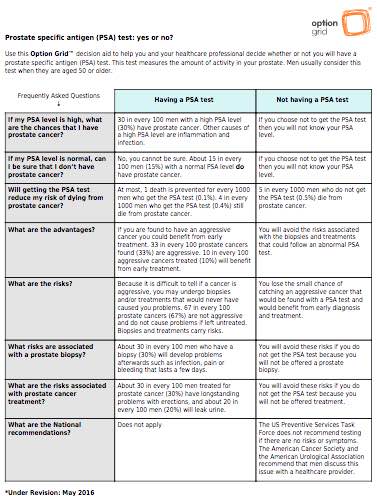Checks for prostate cancer normally involve a blood test, called the prostate specific antigen (PSA) test, and a digital rectal examination (DRE).
If your test results suggest you are at high risk for cancer, you will be referred to a specialist, who may recommend another test called a prostate biopsy.
The prostate-specific antigen (PSA) test
This test measures the level of PSA in your blood. PSA is a protein made by your prostate. Higher than normal levels can occur when there is a problem with your prostate, such as an infection, an enlarged prostate or prostate cancer.
Most men with raised PSA levels don’t have prostate cancer and some men with prostate cancer have normal PSA levels. However, high PSA levels are a risk factor for prostate cancer.
Digital rectal examination
This is a quick way for your doctor to check for prostate problems. Your doctor will feel the size and shape of your prostate by inserting a gloved finger into your rectum (bottom). A prostate that is rough, irregular or hard is more likely to have cancer. Some cancers may be too small to be found by a rectal examination.
Specialist referral and biopsy
Your doctor will discuss your prostate check results with you. If the PSA and DRC results suggest you have a high risk for prostate cancer, your doctor will refer you to a urologist (specialist).
The specialist will discuss having a prostate biopsy, in which a small sample of your prostate gland cells are taken for examination.
The aim of the biopsy is to confirm whether or not you have prostate cancer and, if so, whether it needs treatment. The treatment options will then be discussed with you.
If the biopsy shows no evidence of cancer, you may be advised to attend future check-ups.







